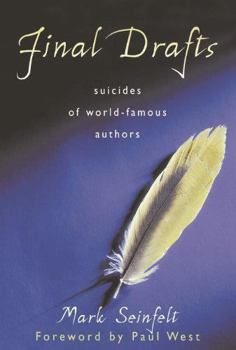Final Drafts: Suicides of World-Famous Authors
Select Format
Select Condition 
Book Overview
Some of the greatest writers in the history of the art-Hart Crane, Ernest Hemingway, Jerzy Kosinski, Sylvia Plath, Anne Sexton, and Virginia Woolf-all chose to silence themselves by suicide, leaving... This description may be from another edition of this product.
Format:Paperback
Language:English
ISBN:1573927414
ISBN13:9781573927413
Release Date:December 1999
Publisher:Prometheus Books
Length:456 Pages
Weight:1.75 lbs.
Dimensions:1.2" x 6.4" x 9.4"
Customer Reviews
3 ratings
With literary variety and a lot of psychology.
Published by Thriftbooks.com User , 22 years ago
A lot of this book is thoroughly literary, with psychological insights. Irony is not listed in the index, but addictions, alcoholism, depression, drugs, manic depression (bipolar syndrome), mental illness, overdose, paranoia, schizophrenia, Vietnam War, World War I, and World War II are listed as some of the mechanisms which were either meaningful to certain writers or a means of explaining their behavior. Readers may pick other topics as their favorite parts of this book, with a few preferring the musical highlights relating to Adolph Hitler, Richard Wagner, and someone whose family was full of the suicidal tendencies of people who have problems adjusting to the world as it is. The ultimate irony, for me, would be if this book demonstrates something about the fatal nature of truth, if each of the subjects can be shown to have known something that the rest of us have not figured out yet.Those of us who are still alive have little reason to worry that our own mechanisms for clinging to life will be vividly portrayed in a book of this nature, but some people have official positions which call on them to interact with famous people in a way which this book cannot ignore. In the case of William H. Webster, director of the F.B.I. in 1979, his contribution to this book was a public statement concerning a rumor printed on May 19, 1970, "Papa's said to be a rather prominent Black Panther," (p. 335) about Jean Seberg, wife of Romain Gary, "but that the story had been broken independently by Haber shortly after the bureau had given the go-ahead to its Los Angeles division to disseminate the rumor." (p. 336). Webster's statement, "The days when the FBI used derogatory information to combat advocates of unpopular causes have long since passed. We are out of that business forever." (p. 336). Recent news that Webster has been appointed to head an accounting oversight board, after leading an auditing committee at U.S. Technologies which fired an auditor who wanted to dwell on derogatory information, leaves us up in the air on who is capable of coming up with more derogatory information, and what people who have it are supposed to do with it. Manic traits associated with such a situation include, "In conversation, she is a perpetual monologist, and ignores or disregards the interpolations of those about her. If someone continues to interrupt or contradict her, she may fly into a fit of virulent rage. Often she suffers from a persecution complex or else feels that she is surrounded by incompetents." (p. 435). Medicine might be more appropriate than death in most cases, but it shouldn't be surprising that one of the chapters of this book is about John Kennedy Toole, author of A CONFEDERACY OF DUNCES.
Unique, fascinating, informative reading.
Published by Thriftbooks.com User , 24 years ago
Some of the greatest writers in the world chose an untimelydeath by suicide, and this charts their lives and psychologicalconditions. It's hard to easily categorize this treatise, which considers both their literary lives and their psychology; but any studying such writers from Anne Sexton and Ernest Hemingway to the more modern Michael Dorris, will find Final Draft an important survey covering more than a century of literary figures.
Not as depressing as I thought
Published by Thriftbooks.com User , 25 years ago
When I first picked up the book, Final Drafts, I thought it would be a series of depressing tales of writers who led desperate lives, ending them because of hopelessness, drug addition or failure.Although many fit this criteria, Seinfelt managed to bring out a epathy towards these writers. He also managed to convey the fact that their lives were not wasted or thrown away, but even though wracked by pain, guilt or other strong emotion, many created works of art that endure today. I also got the sense that without their art, these individuals would not have lived as long as they did.However, this does not pertain to all writers in the book. I felt people like Hitler (even treated unkindly by Seinfelt) and others did not belong in the same book as writers such as Mishima. The largest flaw in the book is that writers like Hitler should have been removed and the book shortened to include mostly writers driven to suicide by mental illness, failure or other cause beyond their control. With some good editing and removing about 150 pages, I would given this book 5 stars.






